The Iliad (Penguin Classics) Read online
Page 10
‘You, Agamemnon, though you have the authority, do not rob him of his girl. The Greek army gave her to him first. Let him keep his prize. And you, Achilles, give up your desire to cross swords with your leader. Through the authority he derives from Zeus, a leader who holds the sceptre of power has more claim to our respect than anyone else. Even if you, with a (280) goddess for mother, are the better fighter, yet Agamemnon is your superior since he rules more people. Agamemnon, cool your fury; I, Nestor, entreat you to put aside your anger against Achilles who is a mighty tower of strength for every Greek in the hell of battle.’
Lord Agamemnon replied and said:
‘Venerable sir, all that is very true. But this man here wants no superiors: he wants to dominate everyone, to lord it over everyone and to give us each our orders, though I know one (290) person who is not going to stand for that. What if the everlasting gods did make a spearman of him? Does that entitle him to hurl insults – ?’
Abruptly, godlike Achilles replied:
‘A pathetic little nonentity I shall be called, for sure, if I give in to you at every point, no matter what you say. Issue your commands to the rest. Don’t tell me what to do. I have done with taking your orders. And I’ll tell you something else, and you bear it in mind. I am not going to fight you, or anyone else, with my bare hands for this girl’s sake. You Greeks gave her to me, and now you take her back. But there’s much else by my (300) swift black ship that is mine, and you will take none of that against my will. Come on, just try, so that everyone here can see what happens. Your black blood will soon be flowing down my spear.’
The war of words was over. The two stood up and dismissed the assembly by the Greek ships. Achilles, with Menoetius’ son Patroclus and his Myrmidon troops, made off to his hut and ships; while Agamemnon launched a swift ship into the water, chose twenty rowers, loaded the offering of cattle for sacrifice (310) to the god and seated fair-cheeked Chryseis on board. Quick-thinking Odysseus went as their leader and, when everyone was aboard, they set off along the highways of the sea.
Meanwhile Agamemnon ordered the army to purify itself by bathing. When they had done this and thrown the dirty water into the waves, they offered perfect sacrifices of bulls and goats to Apollo on the shore of the murmuring sea. The smell of sacrifice, mixed with the curling smoke, went up into the sky.
While the army was engaged on these duties in the camp, Agamemnon did not forget his quarrel with Achilles and the (320) threat he had made at the assembly. He spoke to Talthybius and Eurybates, his heralds and busy attendants:
Agamemnon has Briseis fetched
‘Go to Achilles’ hut, take fair-cheeked Briseis by the hand and bring her here. If he refuses to let her go, I shall come in force to fetch her myself, which will be all the worse for him.’
So he spoke, and bluntly dismissed them. The two made their unwilling way along the shore of the murmuring sea till they reached the Myrmidons’ huts and ships, where they found (330) Achilles himself sitting by his own black ship. It gave him no pleasure to see them. They came to a halt, too terrified and embarrassed before their lord to address him or ask anything. But he realized what was going on and spoke out:
‘Heralds, ambassadors of Zeus and men, welcome. Come in. My quarrel is not with you but with Agamemnon, who sent you here to fetch the girl Briseis. Come, Olympian-born Patroclus, bring the girl out and hand her over to these men. I shall count on them to be my witnesses before the blessed gods, before men (340) and before the obstinate Agamemnon as well, if the Greeks ever need me again to save them from some terrible disaster. That man is raving mad, incapable of understanding the past or the future, let alone how the army is going to survive when it’s fighting for its life by the ships.’
So he spoke, and Patroclus did as his dear companion had told him, brought out fair-cheeked Briseis from their hut and gave her up to the two men, who made their way back along the line of the ships: the girl went unwillingly with them.
Withdrawing from his men, Achilles broke into tears. He sat (350) down by himself on the shore of the grey sea and looked out across the boundless ocean. Then, stretching out his arms, he poured out prayers to his mother:
Achilles appeals to his mother THETIS
‘Mother, since you, a goddess, bore me to live the briefest of lives, surely high-thundering Olympian Zeus owes me some measure of respect. But he pays me none – not even a little. Look how wide-ruling Agamemnon son of Atreus has dishonoured me. He took my prize, made off with her in person and now he has her for himself.’
So he spoke in tears, and his lady mother heard him where she sat in the depths of the sea with her old father. She rose (360) swiftly from the grey water like a mist, came and sat by her weeping son, stroked him with her hand and said:
‘My child, why these tears? Why this sorrow? Tell me, don’t keep it to yourself. We must share it.’
Swift-footed Achilles sighed heavily and said:
‘You know and, since you know, why should I tell you the whole story? We went to Thebe, Eëtion’s sacred town, sacked it and brought back all the plunder. The sons of the Greeks shared it out among themselves in the proper way and chose (370) fair-cheeked Chryseis for Agamemnon. Then Chryses, priest of the Archer-god Apollo, came to the ships of the bronze-armoured Greeks to recover his captured daughter. He brought with him an immense ransom and carried the emblems of the Archer-god Apollo on a golden staff in his hands. He spoke in supplication to the whole Greek army, and most of all its two commanders, Agamemnon and Menelaus, the sons of Atreus. Then all the other Greeks shouted in agreement. They wanted to see the priest respected and the splendid ransom taken. But this was not at all to Agamemnon’s liking. He cruelly and bluntly dismissed the priest.
(380) ’So, the old man went back in anger; but Apollo listened to his prayers – the priest was very dear to him – and launched his deadly arrows at the Greek army. The men fell thick and fast, since the god’s arrows rained down on every part of the broad Greek camp. At last a prophet who understood the god’s will explained the matter to us. I was the first to rise and advise them to appease the god. This made Agamemnon furious. He leapt to his feet and threatened me. And now he has carried out his
(390) threats. The dark-eyed Greeks are taking Chryseis to Chryse in a swift ship with offerings for the god, while Agamemnon’s heralds have just gone from my hut with the girl Briseis, whom the army gave to me.
THETIS asked to intervene with ZEUS
‘So now, if you have any power, protect your son. Go to Olympus and, if anything you have ever said or done has warmed the heart of Zeus, remind him of it as you supplicate him. For instance, in my father’s house I often heard you proudly telling us how you alone among the gods once saved Zeus who darkens the clouds from a terrible disaster when some of the other (400) Olympians – Hera, Poseidon and Pallas Athene – had plotted to throw him in chains. You, goddess, went and had him released. You immediately summoned to high Olympus that monster with a hundred arms – the gods call him Briareus, but mankind Aegaeon – a giant more powerful even than his father. He took up his position beside Zeus son of Cronus, exulting in his glory, and the blessed gods slunk off in terror, leaving Zeus free.
‘Sit by him now, take him by the knees and remind him of that. Persuade him, if you can, to help the Trojans and to fling the Greeks back on their ships, pen them hard against the sea (410) and massacre them. That would teach them the true measure of their leader. Make wide-ruling Agamemnon son of Atreus realize the delusion he is under in giving no respect to the best of all the Greeks.’
Thetis replied in tears:
‘My son, my son! Cursed in my child-bearing, was it for this I nursed you? If only you could have been left to pass your days without tears or trouble beside the ships, since destiny has given you so short a life, no time at all. As it is, you are not only doomed to an early death but also to a most miserable life. It was indeed to an evil destiny that I brought you into the world.
(420) ’Neverth
eless, I will go to snow-capped Olympus to tell all this myself to Zeus who delights in thunder, and I will see whether I can move him. Meanwhile, stay by your swift ships, keep up your anger against the Greeks and take no part in the fighting. Yesterday, I must tell you, Zeus left for Ocean to join the matchless Ethiopians at a feast, and all the gods went with him. But in twelve days’ time he will be back on Olympus, and then I shall go to his bronze-floored palace where I will fall on my knees at his feet. I am convinced he will do what I ask.’
With these words she departed and left Achilles there, anger mounting in his heart at the treatment of his well-girdled woman (430) Briseis, whom they had taken from him against his will.
[Day 11] Chryseis is returned to her father
Meanwhile Odysseus and his crew reached Chryse with the sacred offerings. When they had brought their ship into the waters of the deep-bayed port, they gathered up the sails and stowed them in the black ship’s hold, quickly slackened the forestays, dropped the mast into its crutch, rowed the ship into her moorings, threw out anchor-stones from the prow into the sea, tied up the stern hawsers on land and disembarked on to the beach.
The cattle for the Archer-god Apollo were landed, and Chryseis (440) stepped ashore from the seafaring vessel. Quick-thinking Odysseus then led the girl to the altar, gave her back into her father’s arms and said:
‘Chryses, Agamemnon lord of men has ordered me to bring you your daughter and to make a sacred offering of oxen to Apollo on the Greeks’ behalf, in the hope of pacifying the god who has been inflicting sorrow and mourning on our men.’
With these words he handed the girl over into the arms of her father, who joyfully welcomed his beloved child.
The sacred offering of oxen to do honour to the god was quickly set in place round the well-built altar. The men rinsed (450) their hands and took up the sacrificial grains. Then Chryses lifted up his hands and prayed aloud:
‘Hear me, Apollo, lord of the silver bow, protector of Chryse and holy Cilla, mighty ruler over Tenedos! You heard me when I prayed to you before; you showed your respect for me and struck a great blow at the Greek army. Now grant me a second wish and lift the loathsome plague from the Greeks.’
So he spoke in prayer, and Phoebus Apollo heard him. When they had made their prayers and thrown the grain over the victims, they first drew back the animals’ heads, slit their throats (460) and skinned them. Then, for the god’s portion, they cut out the thigh bones, wrapped them in folds of fat and laid raw meat from the rest of the animal above them. These pieces the old priest burnt on wooden spits while he poured libations of red wine over them and the young men gathered round him with five-pronged forks in their hands. When the god’s portion had been consumed by fire, they ate the offal and then carved the rest of the victims into small pieces, pierced them with skewers, roasted them carefully and drew them all off.
When their work was done and the meal prepared, they feasted, and no one went without a fair share. Their hunger and (470) thirst satisfied, the young men filled the mixing-bowls to the brim with wine and went round the whole company, pouring some into each cup for a libation to the god. And for the rest of the day the young Greek warriors sang and danced to appease the god with a beautiful hymn celebrating the Archer Apollo, to which he listened with delight.
When the sun set and darkness fell, they lay down to sleep by the hawsers of their ship. But when early-born, rosy-fingered Dawn appeared, they set sail for the broad Greek camp, taking advantage of a favourable breeze the Archer-god had sent them. (480) They put up their mast and spread the white sail. The wind filled its belly, and a dark wave hissed loudly round her keel as the vessel gathered way and sped through the swell, forging ahead on her course. So they returned to the broad Greek camp, where they dragged the black ship high up on the sandy shore and kept it upright with wooden props. That done, they dispersed to their several huts and ships.
But Olympian-born son of Peleus swift-footed Achilles was (490) sitting by his ships, nursing his anger. He had not only kept away from the fighting but had attended no meetings of the assembly where men win glory. He stayed where he was, eating his heart out and longing for the sound and fury of battle.
Eleven days went by, and at dawn on the twelfth the everlasting gods returned in full strength to Olympus, with Zeus at their head. Thetis, remembering her son’s instructions, emerged in the morning from the waves of the sea, rose into the broad sky and reached Olympus. She found far-thundering Zeus sitting away from the rest of the gods on the highest of Olympus’ many (500) peaks. She sank down in front of him, put her left arm round his knees, took his chin in her right hand and in supplication spoke to lord Zeus son of Cronus:
[Day 21] THETIS supplicates ZEUS
‘Father Zeus, if ever I have served you well among the gods by word or deed, grant me this wish: give honour to my son. He is already singled out for an early death, and now Agamemnon lord of men has dishonoured him. He took his prize, removed her in person and now he has her for himself. But you at least do him honour, Olympian Zeus wise in counsel, and let the Trojans (510) have the upper hand till the Greeks pay back my son and increase the honour in which he is held.’
So she spoke, and Zeus who marshals the clouds made no reply. He sat in silence for a long time, with Thetis clinging to his knees as she had done throughout. Then she asked once more:
‘Promise me faithfully and bow your head in agreement, or else, since you have nothing to fear by doing so, refuse; then I shall know for sure that no other god is less respected than I am.’
Much perturbed, Zeus who marshals the clouds replied:
‘This is going to mean trouble! You will make me fall foul of my wife Hera when she heaps me with abuse for this, as she (520) will. Even as things are, she slanders me constantly before the other gods and accuses me of helping the Trojans in this war.
‘However, leave me now, or Hera may notice us; and I will see the matter through. But first, to reassure you, I will bow my head in agreement – and the immortals recognize no surer guarantee from me than that. When I seal a promise with a nod, there can be no failure to fulfil it, no going back, no deception.’
The son of Cronus spoke and nodded his sable brows. The (530) divine locks rolled forward from the lord god’s immortal head, and great Olympus shook.
ZEUS nods to THETIS; HERA’srage
The agreement was made, and the two now parted. Thetis plunged down from glittering Olympus into the salt-sea depths, while Zeus departed for his own palace. There the whole company of gods rose from their seats in their Father’s presence. There was no one that dared to keep his seat as he approached; they all stood up as he came in.
So Zeus sat down on his throne; and Hera had seen, and knew that he and silver-footed Thetis, daughter of the Old Man of the Sea, had hatched a plot between them. At once she spoke to Zeus with cutting words:
(540) ’Which god has been hatching plots with you this time, you arch-deceiver? How like you it is to wait till my back is turned and then cook up some secret schemes, on your own. You have never been willing to confide in me.’
The Father of men and gods replied to her:
‘Hera, don’t expect to learn all my decisions. You would find the knowledge hard to bear, although you are my wife. What it is right for you to hear, no man or god shall But when I choose to take a step without referring to the gods, (550) don’t cross-examine me about it.’
Ox-eyed lady Hera replied:
‘Dread son of Cronus, what are you suggesting now? Surely it was never my way to pester you with questions; you are at liberty to make whatever decisions you like. But now I have a terrible fear you have been talked round by silver-footed Thetis, daughter of the Old Man of the Sea. She sat with you this morning and took you by the knees. This makes me suppose you have given your word to her to honour Achilles and let the Greeks be slaughtered in their multitudes by their ships.’
(560) Zeus who marshals the clouds replied and said:
�
��Remarkable! You can never stop ‘‘supposing’’. I can keep no secrets from you. But there is nothing you can do – except to turn me even more against you, which will be all the worse for yourself. If things are as you say, you may take it that my will is being done. Sit there in silence and obey me, or all the gods on Olympus will be of no help in keeping me off when I lay my unconquerable hands on you.’
So he spoke, and ox-eyed lady Hera was afraid and, (570) restraining her feelings, sat down in silence. The Sky-gods in Zeus’ palace were filled with consternation, till at last the great craftsman Hephaestus, who sided with his mother white-armed Hera, began to address them:
HEPHAESTUS restores the peace
‘This is going to mean trouble, and we are not going to put up with it, with you two squabbling over mere mortals and setting the gods at loggerheads. It will be impossible to enjoy a good feast with so much trouble in the air. I do advise my mother, who knows well enough what is best, to make her peace with my dear Father Zeus, or she may draw another rebuke from him and the feast (580) be entirely spoilt. If he wanted to, the Olympian lord of the lightning flash, our superior by far, could blast us all from our seats. No, Mother, deal with him tactfully, and the Olympian will be gracious to us again.’
So he spoke, hurried forward with a two-handled cup, put it in his mother’s hands and said:
‘Mother, be patient and swallow your resentment, or, muchas I love you, I may see you thrashed here in front of me. A distressing sight for me, but I will be unable to do anything to (590) help you. The Olympian is a hard god to resist. Why, once before, when I was trying to save you, he seized me by the foot and hurled me from the threshold of Olympus. I flew all day and, as the sun sank, I fell, all the life knocked out of me, on Lemnos, where I was picked up and looked after by the Sintians.
’ So he spoke, and the goddess white-armed Hera smiled and took the cup from her son, still smiling. Then Hephaestus went on to serve the rest in turn, beginning from the left, with sweet nectar which he drew from the mixing bowl; and a fit of helpless (600) laughter seized the blessed gods as they watched him bustling up and down the hall.

 The Odyssey
The Odyssey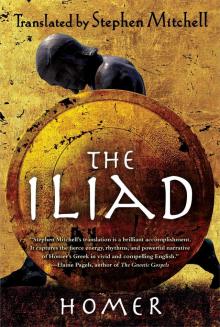 The Iliad
The Iliad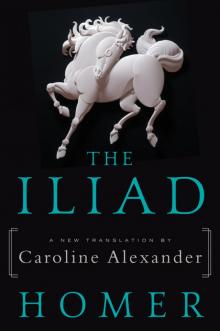 The Iliad (Trans. Caroline Alexander)
The Iliad (Trans. Caroline Alexander)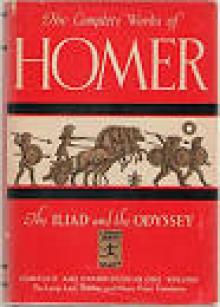 Complete Works of Homer
Complete Works of Homer The <I>Odyssey</I>
The <I>Odyssey</I>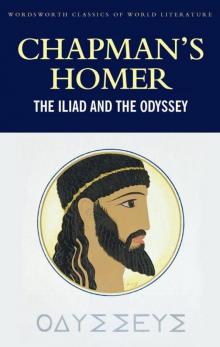 The Iliad and the Odyssey (Classics of World Literature)
The Iliad and the Odyssey (Classics of World Literature)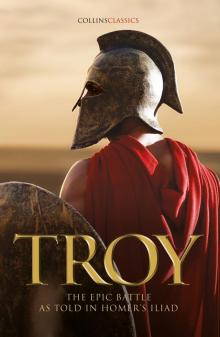 Troy
Troy The Iliad (Penguin Classics)
The Iliad (Penguin Classics) Delphi Poetry Anthology: The World's Greatest Poems (Delphi Poets Series Book 50)
Delphi Poetry Anthology: The World's Greatest Poems (Delphi Poets Series Book 50)